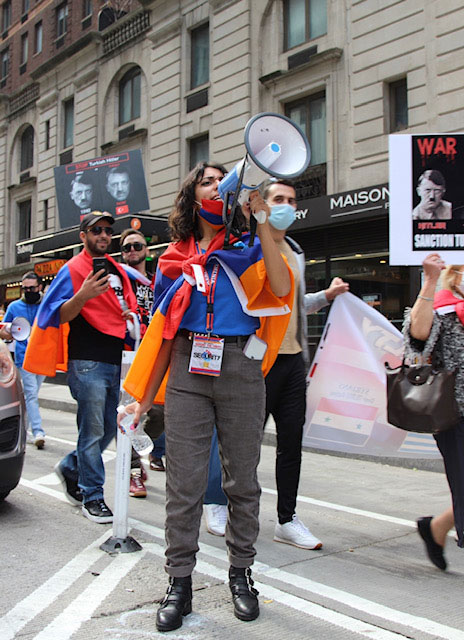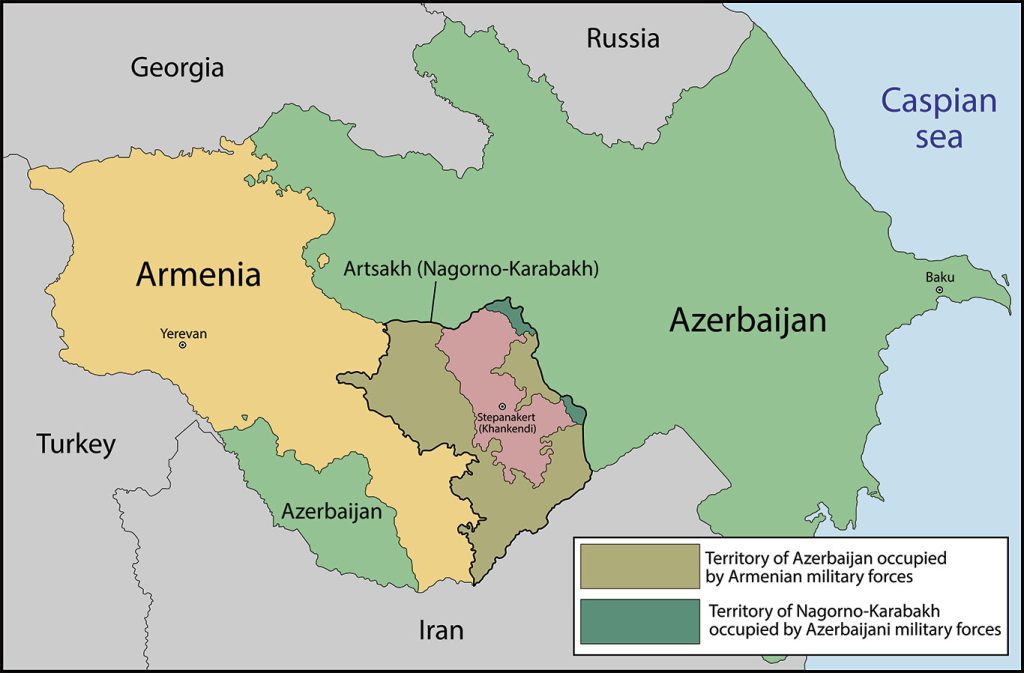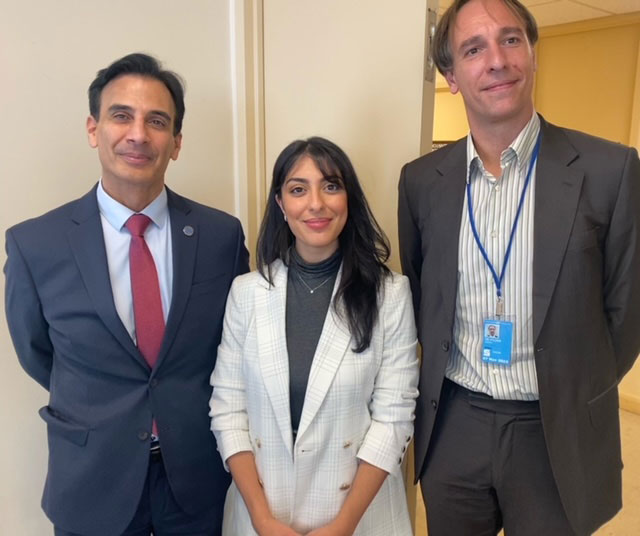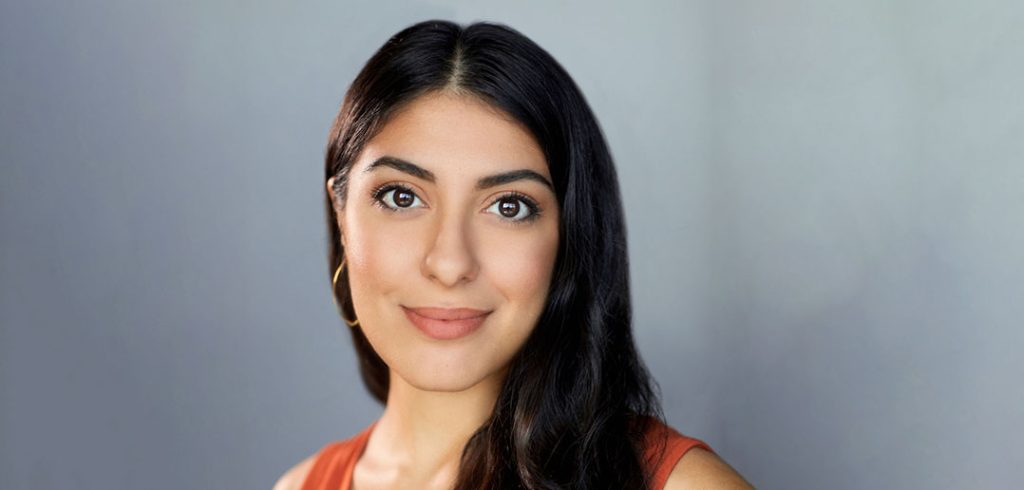When the pandemic abruptly shuttered every one of New York City’s theater, television, and film productions in 2020, Ani Djirdjirian found herself at a crossroads. Although her undergraduate acting degree had once netted her acting jobs and sketches on Late Night with Seth Myers, she found that her work had completely dried up.
But while the acting scene was silent in New York, things were anything but quiet in Armenia, where Djirdjirian’s family hails from. In September 2020 a war broke out between Armenia and Azerbaijan over the territory of Nagorno-Karabakh, a semi-autonomous state that is populated by ethnic Armenians but lies within the internationally recognized borders of Azerbaijan.
The area, which was once part of the Soviet Union, has been a source of conflict since 1988 when residents declared their independence from Azerbaijan and allegiance to Armenia. Fighting in the September 2020 war lasted 44 days and resulted in nearly 7,000 deaths before a ceasefire was declared.

Djirdjirian joined members of the Armenian diaspora in New York City to support the civilians and fighters in Armenia and to call attention to their plight, which has been documented by the group Genocide Watch. In addition to shipping supplies to Armenians, she helped organize multiple protests, including “Report the Truth” march, which started at NBC’s Rockefeller Center studios and ended at ABC’s studios at Lincoln Center, where organizers staged a three-hour rally.
She also enrolled in Fordham’s Graduate School of Service (GSS), and in December she will graduate with a Master’s in Social Work. In addition to sounding the alarm about the plight of Armenians, Djirdjirian now hopes to tend to the mental health needs of the diaspora.
“In 2020, we were doing all these things, and unfortunately, we were getting no media attention. A lot of us in the community had burned out. Our mental health was not good, our physical health was not good. We were not sleeping, we were not eating, and we were still expected to go about our day as if our people were not being murdered,” she said.
“So, I said, ‘I need to help in a more official capacity.’ If that means that I need to get my master’s in social service and pick up a few skills that I can apply to this situation, then that’s what I need to do.”
A Volatile Situation
In September of this year, Azerbaijan forces attacked Armenia and for the first time, crossed the internationally recognized border between the two countries. A cease-fire was declared on Oct. 7, but the peace is fragile. Armenia belongs to an umbrella alliance that is overseen by Russia, but news reports have indicated that Russian leaders’ preoccupation with its war with Ukraine may be distracting them from other arrangements, such as those in Armenia.
Complicating matters further, Azerbaijan receives support from Turkey, with whose people it shares ethnic ties. Although Turkey is a United States ally and a member of NATO, the United States government has taken the side of Armenia when it comes to what is known as the Ottoman-era Armenian genocide. That event, which took place in the early 20th century and resulted in the death or deportation of an estimated 1.5 million Armenians, happened when Turkey was the seat of what was then the Ottoman Empire and is recognized by the White House every April 24.
On Sept. 22, U.S. Speaker of the House Nancy Pelosi visited Armenia to show support for the country. Djirdjirian said she found it heartening and said she hoped it would lead to pressure to cut aid that the United States currently contributes to Azerbaijan.
“It definitely gives me hope, because not only did Pelosi visit Armenia, but she made a very clear statement naming Azerbaijan as the aggressor who needs to back off their offensive. That is the first time in history that someone from the U.S. has made that very clear distinction,” she said.

Gaining the Tools to Help Others
At Fordham, Djirdjirian found the tools she needs to influence policy through classes such as International Social Development and Capacity Building, which she took with Marciana Popescu, Ph.D., and her field placement at the Goddard Riverside Community Center, which is two blocks away from the Lincoln Center campus.
Popescu, who works extensively on behalf of asylum seekers, said that one of the goals of GSS is to train students to think systemically and look at all the factors contributing to complex problems. The situation in Armenia was a complex emergency with multiple possible crises, and that was even before the COVID pandemic, she said.
“Is Ani prepared? Yes. Does she have a lot to learn to truly be instrumental in the work she wants to do? Absolutely. But she came across in my class as someone who realizes she has a lot to learn, she knows how to listen, and she’s great at networking and identifying people and groups who can support her in her effort,” she said.
Popescu noted that when she was still a student, her mentor told her the best social workers “are entering through the client’s door,” much as Djirdjirian will be if she works directly with those affected by the crisis after graduation.
“The caveat is that when you come through the client’s door, you really have to address your own trauma; otherwise, you’ll be triggered by the trauma of others,” she said.
“You don’t need to be the client, but when your family has been discriminated against, you understand that and if you decide to find a way to address it for your family and beyond, you become a much more capable graduate student.”
Djirdjirian is right to focus on the way that collective trauma can be passed on through generations, given Armenia’s history, Popescu said.
“When I think about the displacement that the Armenian population has had to deal with, you have people scattered around the world, carrying around with them trauma that they don’t have the resources to address,” she said.
“Let’s say a person identifies a therapist who speaks their language. That means a lot. [But they may] still be facing a therapist who has absolutely no understanding of the trauma that they’re carrying or the experience of conflict and displacement they lived through. That’s what happens with displaced, traumatized populations, where generations after generations carry that trauma with them, and now they’re bringing it into a new context.”
Connecting to the International Community
At Goddard Riverside Community Center, where Djirdjirian, Susan Matloff-Nieves, vice president for innovation and justice, said she recognized early on that Djirdjirian would benefit as much from her organization’s international connections such as the International Federation of Settlements (ISF) as she would from working on local issues, such a get out the vote campaign and with youth and young adults.

She connected Djirdjirian with Bobbi Nassar, a member of IFS who is a co-chair of the United Nation’s NGO Committee on Human Rights. Through Nassar, Djirdjirian is learning how change happens on an institutional level, Matloff-Nieves said. On Oct. 27, for instance, Djirdjirian presented a briefing on the status of Armenia to the U.N.’s Office of the High Commissioner for Human Rights in New York and the Office of Disarmament Affairs.
“Good community organizing requires good relationship building. You have to build those individual relationships,” she said, noting that clinical work and community organizing both rely on building relationships and supporting people to change behavior.
Post-Graduation Plans
Djirdjirian is realistic regarding the challenges ahead. Asked to describe Armenia’s plight in a nutshell, she points to the philosophy of Pan Turkism, whose goal is to unite all Turkic peoples, such as those in Turkey and Azerbaijan. Armenia, whose people are not Turkic, is stuck between the two, and Djirdjirian fears that because Armenians were the victim of genocide once before, the current conflict may spiral out of control again as the Turkish and Azerbaijan governments push to unify their peoples.
She plans to continue to advocate for Armenians and hopes to combine her new skills with the skills she had before she came to Fordham.
“If I can take this human rights knowledge and spread the word through my art, whether it’s writing, music, or creating a documentary, or some sort of campaign that will move people, I think that’s what I need to do,” she said.
“I don’t know what it’s going to look like, but I’m trusting that it will reveal itself to me through this work and just through time. I know that when the time is right, something beautiful is going to come of marrying these two.”
—Photos courtesy of Ani Djirdjirian

